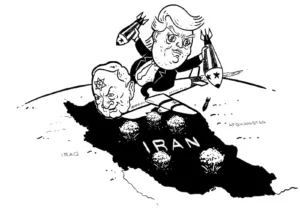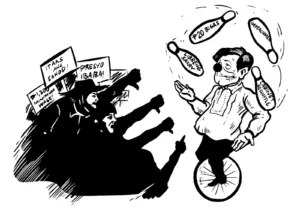By JOSE MARIA SISON
Founding Chairman, Communist Party of the Philippines
Delivered at the International Forum on the Great Proletarian Cultural Revolution and Lessons to the Working Class Movement
The Netherlands, 1 April 2007
I wish to speak on the significance and relevance of the Marxist-Leninist struggle against modern revisionism since 1956 and the Great Proletarian Cultural Revolution (GPCR) since 1966. And I wish to deal with this large subject by examining the impact and consequences of the aforesaid historic events to the Communist Party of the Philippines (CPP).
May I declare at the outset that the resoluteness, militancy, resilience and victories of the CPP have been immeasurably inspired by the anti-revisionist struggle and the GPCR led by Comrade Mao. These have contributed to the strong foundation of the CPP, its invincibility and victories in the course of struggle in the last 38 years and its unwavering confidence in the resurgence of socialism and the ultimate victory of communism.
The Struggle Against Modern Revisionism
In 1963 the Filipino revolutionaries began to sum up and analyze the historical experience of the Communist Party of the Philippine Islands (1930 to 1938) and the old merger party of the Communist and Socialist Parties (1938 to 1968). We sought to resume the armed revolution and to know why this had failed previously.
We were guided by the Marxist-Leninist theory of state and revolution and we were certainly deeply influenced by the works of Comrade Mao on the new democratic revolution through people’s war. Revolutionary storms were rapidly developing in Southeast Asia and elsewhere.
At that time, the struggle between the Marxist-Leninist line and the line of modern revisionism had already broken out, mainly between the Communist Party of the Soviet Union (CPSU) and Communist Party of China (CPC. We the Filipino proletarian revolutionaries stood up for the Marxist-Leninist line, even as some of the key cadres in the old merger party insisted that the CPSU and the CPC were not in contradiction over fundamental revolutionary principles but were debating merely about methods of struggle.
Such cadres would later become well-defined as the Lava revisionist renegades in 1967. Having failed to rebuild the old merger party since it was crushed in the years of 1950 to 1952 and practically liquidated since 1957, they had no choice for a while but to have amicable relations with the proletarian revolutionaries who were leading the newly-formed branches of the old merger party, the major mass organizations and the resurgent anti-imperialist, anti-feudal and civil libertarian mass movement.
We the proletarian revolutionaries were determined to develop the mass movement in order to carry out the new democratic revolution through protracted people’s war under the leadership of the working class party. We were strongly opposed to the Khruschovite revisionist line of bourgeois populism (“party of the whole people” and “state of the whole people”) and bourgeois pacifism (“peaceful transition”, “peaceful competition” and “peaceful co-existence”).
We held the position that Khrushchov had vilified and totally negated Stalin under the pretext of rejecting the “cult of personality” in order to attack Marxism-Leninism and socialism. We became aware of Comrade Mao’s criticism in April 1956 of Khrushchov’s anti-Stalin speech in February 1956 and the debate on the issues in the 1957 and 1960 Moscow meetings of communist and workers’ parties. We eagerly studied the wide range of issues that emerged in the open debate between the Communist Party of China (CPC) and the Communist Party of the Soviet Union in the early 1960s.
We became aware of the decentralizing and confused reorganizations done in the Soviet party, state, economy and culture in order to subvert Marxism-Leninism and socialism. We saw as wrong Khrushchov’s admiration for Titoite revisionism, which included rejection of land reform and central planning. We saw through the economism and opportunism in Khrushchov’s promise of achieving communism in twenty years by changing the material and cultural foundation of Soviet society through bourgeois economic reforms.
We were indignant over Khrushchov’s policies towards other countries. He cancelled all the agreements and blueprints of economic cooperation with China in retaliation for the anti-revisionist line of the CPC in the ideological debate. He refused to extend effective support to the preparations and efforts of the Vietnamese people to wage a war of national liberation against US imperialism and its puppets. He encouraged the revisionists in Eastern Europe to take power and change policies. He promoted the practice of neocolonialism in relations with the countries in Eastern Europe, and Asia.
As a result of obvious bunglings, Khrushchov was deposed and replaced by Brezhnev in 1964. Some of the old cadres who had believed that the debate between the CPSU and the CPC was only about methods of struggle thought that the ascendance of Brezhnev meant a consolidation of the Marxist-Leninist ideology and the practice of socialist revolution and construction because of the renewed Soviet revolutionary phrase-mongering and the recentralization of the ministries decentralized by Khruschov.
We understood what Khrushchovism without Khrushchov meant. Brezhnev widened the revisionist breaches made by Khrushchov on the ideological, political and organizational line of the Soviet party and on the socialist state, economy and culture even as he recentralized the bureaucracy for the purpose of bureaucrat monopoly capitalism and strengthened the Soviet military for the purpose of big power politics and social imperialism.
What had started as the petty bourgeois social base (including degenerate sections of the bureaucracy and intelligentsia, the new kulaks and merchants) generated the big bureaucrat monopoly bourgeoisie and its retinue of criminal big bourgeois in the private sector who manipulated and stole from state enterprises and warehouses and who increased their role in domestic and foreign trade.
The summing-up and analysis of the history of the old merger party matured among the proletarian revolutionaries towards the end of 1965. Earlier the Executive Committee of the old merger had assigned this speaker to draft the general report for a new congress of the old merger party. I included the evaluation of the old merger party in terms of the Marxist-Leninist ideological line, the general political line of people’s democratic revolution and the organizational line of democratic centralism.
The draft general report sparked a debate and a division in the old merger party between the proletarian revolutionaries or the Marxist-Leninists and the Lava revisionists. The issues involved mainly how the series of Lavaite leaders in the old merger party had caused one disaster after another, how they had been afflicted by subjectivism and opportunism, how they failed to develop the Party, the people’s army and the united front as weapons of the revolution and how they neglected land reform, armed struggle and mass base building as integral components of the armed revolution.
The Marxist-Leninists completely broke away from the Lava revisionist renegade in April 1967. They issued a declaration on May 1, 1967 and announced the plan to reestablish the Communist Party of the Philippine (CPP). The Lava revisionists also issued their own declaration. The Marxist-Leninists launched what is now called the First Great Rectification Movement based on the document, “Rectify Errors and Rebuild the Party. They also formulated a new Party Constitution and the Program for a People’s Democratic Revolution in order to establish the Communist Party of the Philippines on December 26, 1968, under the theoretical guidance of Marxism-Leninism-MaoZedong Thought (or Maoism).








